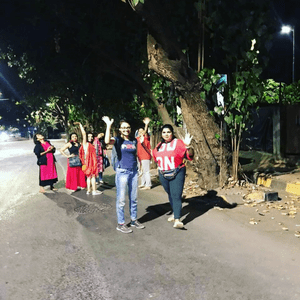Loitering is a form of resistance. When Indian women are out on the street at any time of day, we face male criticism and harassment. It doesn’t matter how hard we try or how unaffected we appear.
WhyLoiter, a campaign started by two Indian women, is saying goodbye to stranger danger by reclaiming public spaces for women.
It all started when these two Indian women put up defiance and strolled the streets of Mumbai after events of crime against women. WhyLoiter, a movement to make women feel safe and other marginal communities comfortable at transport.
The social cause has grown and has even spread to Pakistan. Indian women assert their rights to public spaces by the baffling male gaze.
Shilpa Phadke, Sameera Khan, and Shilpa Ranade, the three Indian women from Mumbai, started the WhyLoiter initiative to make transport safer for women.
A series of events triggered these Indian women and started the movement to reclaim public space by defying the norms. Many claims and initiatives have been taken to safeguard the interest of women, whiles some have taken into their hands like India’s first lady bouncer – Mehrunnisa Ali, read about her.
WhyLoiter, the street campaign was inspired by a book of the same name that examined the risks for women across Mumbai. Mad4India brings the initiative of WhyLoiter, and how it is making Indian women feel safe.
Indian Women – The Right To Take Risks

Passengers were seen playing Antakshari in the Mumbai metro. They were singing, laughing, and having fun till they reached their destination. This initiative was under the WhyLoiter, where a group of women would gather and reclaim the public place for the interest of the Indian women.
Antakshari is a game we have all played at some point in our lives. WhyLoiter decided to play the game with strangers. The reason was straightforward and for a good cause. Apart from enjoying and connecting with Indian women on compassion and empathy, which could make public transportation safer and more comfortable.
WhyLoiter came at a time when Indian women’s safety in India was under intense scrutiny following the 2012 fatal gang rape of a student on a bus in Delhi and the 2014 rape of a woman by her Uber taxi driver in Delhi.
While the number of working women and female students in India is increasing, it is unusual to see women out late at night. According to a Thomson Reuters Foundation poll of 15 major cities worldwide, Delhi has the fourth most dangerous transport system for Indian women.

Mumbai, India’s financial center, is thought to be safer, but attitudes toward women in public spaces are just as conservative. Keeping in view the prejudice and misogynistic culture, the WhyLoiter campaign gives the signal of support to fellow Indian women.
The capital of India, New Delhi, is now one of 25 cities in the United Nations’ safe cities project, which includes measures to improve street lighting, install toilets, establish helplines, and strengthen sexual harassment laws.
Under the WhyLoiter campaign, single-led women go on bicycle rides and walk in various parts of the city with other women. The movement has also instigated a demand to relax curfews in college as they have strict curfews compared to men.

The heckling and cat-calling faced by Indian women is a frill in society.
Started by young Indian women, this movement has raised many initiatives and peaked in December 2015. The idea was to invite women to share their stories and images of loitering and having fun in public spaces. Indian women do use public spaces for pleasure. We need to show this to a larger audience.
Taking the motto of Loitering as resistance, it’s a great part for women to feel safe in public spaces. It is a great way to bind and back up each other. As true as it gets, Mad4India hopes to see more such initiatives carry the lead for Indian women’s safety.
Sources of information – Reuters
If you loved reading this story, you can also read about 25-Year-Old RJ From Madhya Pradesh Is Using Community Radio To Spread Awareness On Climate Change
If you know more inspirational stories about any person, company, new idea, or social initiative, write to us on mad4india.com, or share such information with us on Facebook or LinkedIn.




